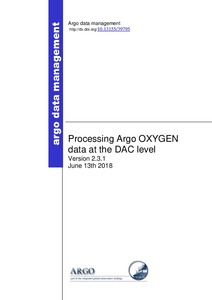Processing Argo oxygen data at the DAC level. Version 2.3.1, June 13th 2018.

View/
Average rating
votes
Date
2018Author
Thierry, Virginie
Bittig, Henry
Denis, Gilbert
Taiyo, Kobayashi
Sato, Kanako
Schmid, Claudia
Status
PublishedPages
138pp.
Metadata
Show full item recordAbstract
This document does NOT address the issue of oxygen data quality control (either real-time or delayed mode). As a preliminary step towards that goal, this document seeks to ensure that all countries deploying floats equipped with oxygen sensors document the data and metadata related to these floats properly. We produced this document in response to action item 14 from the AST-10 meeting in Hangzhou (March 22-23, 2009). Action item 14: Denis Gilbert to work with Taiyo Kobayashi and Virginie Thierry to ensure DACs are processing oxygen data according to recommendations. If the recommendations contained herein are followed, we will end up with a more uniform set of oxygen data within the Argo data system, allowing users to begin analysing not only their own oxygen data, but also those of others, in the true spirit of Argo data sharing. Indications provided in this document are valid as of the date of writing this document. It is very likely that changes in sensors, calibrations and convers.....
Resource URL
http://www.argodatamgt.org/DocumentationPublisher
IFREMER for Argo Data ManagementVillefranche-sur-Mer, France
Document Language
enEssential Ocean Variables (EOV)
oxygenMaturity Level
TRL 8 Actual system completed and "mission qualified" through test and demonstration in an operational environment (ground or space)Best Practice Type
Standard Operating ProcedureManual
DOI Original
10.13155/39795Citation
Thierry, V., Bittig, H., Gilbert, D., Kobayashi, T., Kanako, S. and Schmid, C. (2018) Processing Argo oxygen data at the DAC level. Version 2.3.1. Villefranche-sur-Mer, France, IFREMER for Argo Data Management, 138pp. DOI:/10.13155/39795Collections
 Repository of community practices in Ocean Research, Applications and Data/Information Management
Repository of community practices in Ocean Research, Applications and Data/Information Management